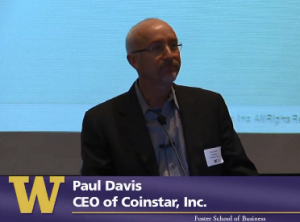Can vending machines be innovative? Definitely.
 Paul Davis, CEO of Coinstar, spoke at the Foster School of Business’s Leaders to Legends Breakfast Series in November 2012. His talk focused on how Coinstar has reinvented itself to become a leader in the automated retail space—otherwise known as kiosks—through innovation.
Paul Davis, CEO of Coinstar, spoke at the Foster School of Business’s Leaders to Legends Breakfast Series in November 2012. His talk focused on how Coinstar has reinvented itself to become a leader in the automated retail space—otherwise known as kiosks—through innovation.
One of the largest and best-known parts of Coinstar’s business is Redbox, the popular automated movie DVD kiosk business. Redbox comprises more than 80 percent of Coinstar’s revenue. Redbox’s business model centers on value, simplicity and convenience, and it’s been highly successful. It’s a $2 billion business and there are over 42,000 Redbox kiosks in the U.S.
In addition to Redbox, Coinstar is involved in eight other companies. These companies, like Redbox, embody value, simplicity, and convenience. A perfect example is Rubi, a new twist on vending machine coffee. Coinstar is launching this in partnership with Seattle’s Best Coffee, which is owned by Starbucks. Rubi utilizes French press technology and offers single cup brewing—beans are ground on the spot—that starts at $1 a cup. It offers affordable, high quality coffee from a vending machine.
Other Coinstar properties include Alula, which allows you to turn gift cards into cash at 70-85 percent of the value of the card, and Eco ATM, which allows you to get cash for your cell phone on the spot. They’re looking at expanding this to all electronics.
Coinstar looks for innovative opportunities in the automated retail space in myriad places. It holds big-idea competitions within the company, talks to venture capitalists and private equity firms, holds white-board competitions at universities, and utilizes a nation-wide innovator network.
Coinstar has also developed criteria and a process for finding new companies. It only considers businesses that can scale or expand outside of the U.S. and that are capable of $100 million in revenue. All of the ideas are also consumer-tested before being seriously pursued. And once an idea is vetted, Coinstar hires an entrepreneur with deep domain expertise to launch and grow the company. The entrepreneur is given four years to do this and his or her compensation is tied to the success of the company. This systematic approach is paying off. All but one of the ideas Coinstar has pursued have succeeded; industry standard is typically a 25 percent success rate.
Coinstar has been steadily rising on Fortune’s “Fastest-Growing Companies” list for the past few years. Despite critics, they are successfully reinventing—or rather inventing—the automated retail space. Look for Coinstar products in all kinds of kiosks near you.
Since giving this talk, Paul Davis announced he will retire from Coinstar. Scott Di Valerio, currently CFO of Coinstar, will become CEO in early April.
Paul Davis was one of UW Foster School of Business Dean Jim Jiambalvo’s guest speakers at the annual Leaders to Legends Breakfast Lecture Series, which include notable leaders in an array of industries from greater Seattle and around the country.
